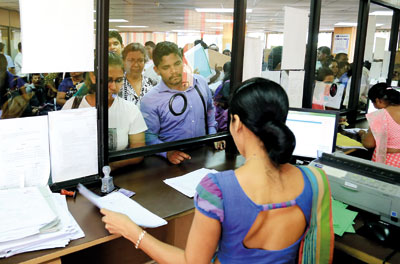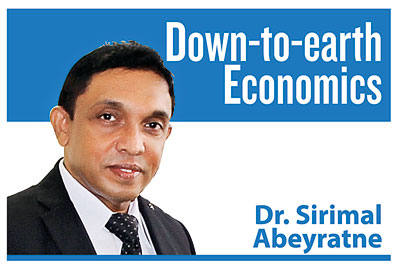Dysfunctional “economy and elitism”
View(s):Much of the economic news I heard during the past few weeks was about the Sri Lankan state being dysfunctional. I am not referring to the standstill of normal activities due to the Sinhala and Tamil New Year vacation. But it is a similar thing extended for a much longer period, resulting in a state of being dysfunctional in terms of the economy or its parts and components. It is a worrying situation because a dysfunctional state will have far reaching economic and political consequences.

File picture of the Registrar of Companies office where an online registration service was introduced to fast-track registrations. Amidst the uncertainty, some state institutions are working at satisfactory levels.
At the Kotelawala Defence University
On March 22, a meeting of the Sri Lanka Forum of University Economists (SLFUE) – Professors and Lecturers, was held at the General Sir John Kotelawala Defence University (KDU). Initially it wasn’t planned to be held there, but at the Sabaragamuwa University.
Trade unions of the university employees suddenly launched a strike. As a result, all the government universities in the country, except one or two such as KDU, became dysfunctional. The KDU did not have such issues so that the organizers were able to shift the meeting venue from Sabaragamuwa to KDU.
There might be differences in opinion (about this university), but I think many must have appreciated the state of discipline and order at KDU which is managed differently from the traditional universities in Sri Lanka. KDU selects the students it wants to admit from among the Sri Lankan and foreign applicants.
Within a few weeks after the release of the GCE Advanced Level results, KDU has the ability to finalize its admission process and admit the students. A student who enters KDU knows his or her academic calendar in advance so that he or she can plan everything for the next 12 months. They enter the university on time, continue with studies without any interruption, sit the examinations as planned, and graduate on the day as mentioned in the academic calendar.
It was about 10 years ago a group of Sri Lankan university students who attended a regional conference reported that they were 3 – 4 years older than their counterparts from Bangladesh, India, and Pakistan. By international standards, students enter the universities at the age of 18 years and graduate at 21 years. This is the age that a Sri Lankan student prepares to enter a university; they are usually about 25 years old or even more, when they become graduates!
Visit of a Japanese Professor
Prof. Hitoshi Osaka – one of our academic friends from a Japanese University, had planned to visit the Colombo University last month. Although we kept him informed about the dysfunctional state of the universities, he was unable to change his months of planning. Anyway, he came and saw that there was nothing happening within our universities.
After having the discussions, we sat with him for lunch. He said: “Under whatever the circumstances public sector employees in Japan never go for strike; it is prohibited there as public sector employees are considered to perform a service to the nation than doing a job.” He continued: “For the same reason, a public sector official hardly loses the job, as it is that much respectable.” I quickly replied: “Oh, we also have that part; at least we share 50 per cent with Japan!”
I hope Prof. Osaka’s work in Sri Lanka was not interrupted by the dysfunctional state of the universities here. Even if it was, does anyone care?
Economic standstill
During the same week I met a senior public sector official who with frustration told me about the dysfunctional state of the public sector that has become worse in the recent past. As a result the activities are not moving and the economy is in a state of limbo while the business sector is in the state of “wait and see.” I asked him: “Usually the ministries should have a vision and a plan for the respective sectors for the next couple of years; do they have anything as such?” He only laughed!
At KDU too, the keynote speech delivered by Dr. W.A. Wijewardena, former Deputy Governor of the Central Bank of Sri Lanka, exposed the current political imperatives that have made the economy dysfunctional. The political imperatives that are moving in two opposite directions effectively left the economy not moving in any direction.
In a political economy environment as such, slowing down growth prospects of Sri Lanka is not surprising. If it continues for the next few years too reporting less than 5 per cent annual rate of growth it won’t be surprising. It is sad to see what should have become the strength of the nation – coalition of major opponents -, turning out to be its weakness now.
In the first week of April, there was an email circulated with an interesting question inviting for answers: Why are political leaders not seeing and acting on issues and challenges we in society see? The question was also accompanied by a coherent answer given by a reputed scholar. Whichever the way you may think of answering that question, its underlying truth is that the political authority of the country is dysfunctional!
Elite class of development
I was also there at KDU attending the SLFUE meeting. Apart from being a member of the SLFUE, I had to review the new issue of the Sri Lanka Journal of Economic Research (SLJER) that was launched at the same occasion. As relevant for our topic today, I like to quote from one of the research papers published in this Journal.
It was on “Rethinking the Development of Post-Conflict Sri Lanka Based on the Singapore Model” authored by Sanika Ramanayake and Chandana Wijetunga. Whenever you hear a title as such you might have the impression about the inappropriateness of such a model for Sri Lanka due to two different political systems. But this was a paper that has deviated significantly from such traditional line of thinking.
One element of the analysis that caught my attention was the building up of an “elite class” that became the catalyst for economic development in Singapore. In every political system, the leadership supports a formation of an elite class on the basis of different attributes. In Singapore it was more on “merit-based” than on any other attributes.
The leadership intentionally built this elite class by selecting the “right” persons on merit-basis to be the Parliamentarians, Cabinet Ministers, key public sector officials, heads of departments and, managers of state-owned enterprises; they formed the “elite class” and carried out the jobs, which converge at the end enabling Singapore to be a rich country.
Accountable for output
There were other strategies adopted in forming this elite class for development; they were paid well so that they did not have to look for commissions, bribes and other forms of corrupt practices and areas with conflict of interests. Anyway, the rule of law was efficient and effective so that there was no room for such things either.
They were also given the autonomy of powers and responsibilities within their purview. On the top of all above, they had to show outcome-based performance so that the accountability was utmost important.
This was the formation of an “elite class” purposively for development in Singapore that was known as “development elitism.” As a result, there was no sector underperforming or malfunctioning on the one hand and, being subject to corrupt practices or external influences on the other hand.
Quality and character of the elite
Formation of an “elite class” by the political leadership is something that you can observe in every country. It has nothing to do with authoritarianism or democracy or any other system. Intentionally or effectively, it is there everywhere and, as the political leadership select the people to be around them and to follow their vision and mission.
What matters is the quality and character of the emerging elite to drive the economy forward; the difference depends on what basis the elite class is chosen, and how much they are equipped with and guided by the necessary regulatory instruments. By looking at the layers of the elite from national to local levels, you can infer where the nation is set forth to move in the future.
(The writer is Professor of Economics at Colombo University. He could be reached at sirimal@econ.cmb.ac.lk)


